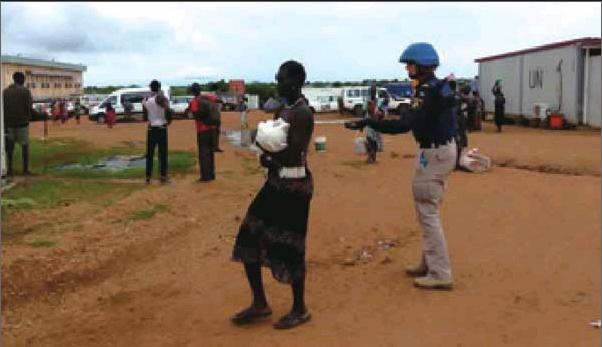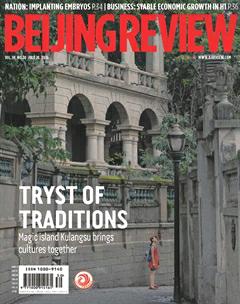Rocky Road to Peace
2016-08-17

South Sudan, the worlds youngest nation, faces an enormous challenge. On July 7, two days before the fifth independence anniversary, troops loyal to First Vice President Riek Machar clashed with President Salva Kiirs soldiers, triggering a conflict that killed more than 300 people in four days. During the violence spree, some UN agencies and refugee camps in the capital, Juba, were also attacked, resulting in casualties among UN peacekeepers. Two Chinese peacekeepers lost their lives, the second time this year that Chinese soldiers were killed in the line of duty in Africa. UN Secretary General Ban Ki-moon condemned the attacks, urging the UN Security Council to take action to ease the conflict and protect civilians. Zhang Zhongxiang, Deputy Director of the Center for African Studies at Shanghai Normal University, traces the protracted instability in South Sudan to both internal conflicts and external intervention, saying the only way out is to stop war and start developing the economy. Excerpts from his views follow:
South Sudan gained its independence from Sudan on July 9, 2011, but independence did not bring the internal conflict to an end. At the end of 2013, fighting between government troops and rebel factions erupted into a conflict that had killed many people and prompted more to flee their homes by the time a tentative, internationally mediated peace agreement was signed in August 2015.
This April, rebel leader Machar finally returned to the capital, Juba, and resumed his old job as first vice president in a new unity government led by President Kiir. But South Sudan has remained in an unstable state, with conflicts continuing and the peace agreement not implemented effectively. There are many reasons why peace remains elusive in South Sudan.
Mutual distrust: Although the two sides signed a peace agreement, and Machar returned to Juba, the agreement doesnt have a sound basis, as both sides have their own armies and cant forget their old enmity. Any little disagreement may trigger conflict.
The latest one started on July 7, when soldiers loyal to Machar fired at a checkpoint manned by Kiirs troops, killing at least five soldiers. The fighting quickly escalated from small-arms fire to heavier weapons, continuing until Kiir and Machar asked their forces to cease fire on the night of July 10.
Tribal conflicts: With a population of about 12 million, South Sudan is highly diverse ethnically and linguistically. Due to a protracted civil war, the use of firearms has proliferated without restrictions, and a culture of violence prevails. President Kiir comes from the Dinka, the countrys largest ethnic group, while Machar is from the Nuer, the second largest group. Mainly living in the oil-rich northern region of South Sudan, the Nuer have been hoping for a bigger share in the distribution of national wealth and power. Thus, they have come into sharp conflict with the Dinka. The conflict between Kiir and Machar is essentially a tribal conflict.
Economic backwardness: South Sudan is one of the worlds poorest countries. Since independence, tribal conflicts have occurred frequently, and economic reconstruction has not been on top of the governments agenda. The oil industry, South Sudans main source of income, has been at a standstill as oil prices have plummeted in international markets and fresh conflict has erupted once again. To survive, each tribe has to fight with other tribes over limited resources.
External intervention: During the 2013-15 civil war in Sudan, in order to have a strategic pivot in northeast Africa and obtain access to oil resources in South Sudan, the United States, the largest external supporter of the independence movement, gave the Sudan Peoples Liberation Movement (SPLM) a lot of military aid. Without this aid, South Sudan could not have gained its independence.
However, the country suffered a civil war soon after independence, which showed that the North-South divide had not brought peace to South Sudan. While a majority of the international community hoped to see peace prevail, it is also possible that some countries wanted to split Sudan to achieve their own vested interests.
Though large-scale conflict in South Sudan has temporarily come to an end, major disputes and contradictions still exist. Therefore, the prospect of stability is not rosy. So where can South Sudan find its road to peace?
First, national reconciliation should be given priority: National reconciliation is critical. Generally, its easy to share hardship but its hard to share victory. During the process of fighting for national independence, the Dinka and the Nuer fought side by side and ultimately won independence for the country.
However, after independence, the two factions in the SPLM started a civil war, which killed 300,000 people and prompted around 400,000 people to flee to neighboring countries such as Kenya, Sudan and Uganda. For the sake of the South Sudanese, South Sudans tribal leaders should not consider expanding their own tribes interests only. Instead, they should establish a multi-ethnic community in order to achieve national reconciliation and civil peace.
Second, African affairs should be resolved by Africans: The hotspot issues in Africa, including the conflict in South Sudan, should be resolved by Africans themselves, instead of by other countriesintervention. Organizations such as the African Union (AU) at the continental level and the Intergovernmental Authority on Development (IGAD) at the regional level should play their part well.
In fact, the AU and IGAD have indeed played an active role in resolving the South Sudan conflict, as exemplified by IGADs mediation in the signing of the peace agreement in August last year with the AUs backing. After the July conflict in South Sudan, African regional organizations and states once again took action. The IGAD held a meeting in Nairobi, Kenya, to discuss how to deal with the situation.
The same day, South African President Jacob Zuma said he was concerned about the conflict in South Sudan and called on South Sudanese leaders to show their leadership in the difficult situation. Kenyan President Uhuru Kenyatta spoke to Kiir about the conflict and urged both Kiir and Machar to stop hostilities. Kenyatta also suggested moving heavy weapons and troops away from the capitals residential areas.
Third, economic development should be the priority: Security is the basis of development, while development can promote security. To transform the security situation, South Sudan needs to develop its economy and improve peoples livelihoods. China has played a positive role in this regard.
After the outbreak of conflict in South Sudan at the end of 2013, China took part in the mediation between the disputing parties. In 2014, China received both a South Sudan government delegation and an opposition delegation and made efforts to promote the peace talks.
In January 2015, Chinese Foreign Minister Wang Yi attended the Special Consultation in Support of the IGAD-led South Sudan Peace Process in Khartoum and made four proposals on how to promote the peace process and speed up political reconciliation. Based on these proposals, the participants reached an important five-point consensus.
In April 2015, China sent 700 troops to assist the UN peacekeeping mission in South Sudan. The Chinese Governments Special Representative on African Affairs, Zhong Jianhua, traveled to the region several times to mediate between the two sides and finally witnessed the signing of the peace agreement in Ethiopia in August 2015.
China has also been involved in the economic and social development of South Sudan. It has helped the country build hospitals, schools and wells, and provided medical equipment, antimalarial drugs and emergency humanitarian supplies. China has also provided human resources training to South Sudanese.
In 2014, the bilateral trade volume between China and South Sudan reached about $4.4 billion, an increase of 73 percent year on year. But, the recent conflict is likely to delay South Sudans reconstruction, especially with many countries evacuating their citizens and companies pulling out their employees.
Peace and development are still the mainstay of the world. So, for countries like South Sudan, resolving conflicts and seeking peace and development are the only way out.
